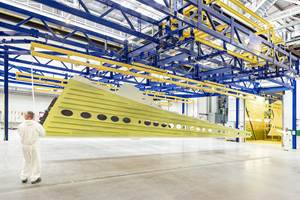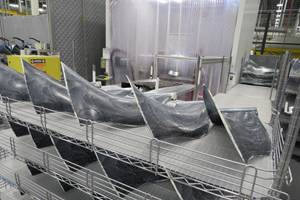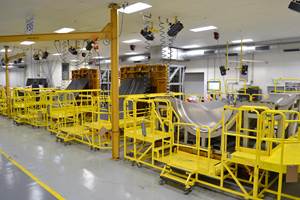Teijin acquires CSP: A safer growth choice?
Teijin’s presence in Auburn Hills is clearly another step into vertical integration of the supply chain.
The news on Sept. 13 that Teijin (Tokyo, Japan) had agreed to acquire Continental Structural Plastics (CSP, Auburn Hills, MI, US) for US$825 million and become a Tier 1 supplier of high-performance automotive composites came not as a bombshell, but more of a weather alert with tsunami-like reverberations throughout the composites industry.
Mr. Jun Suzuki, Teijin’s president & CEO since January 2014, was now saying some impressive things about pursuing “business models that help provide value-added solutions by combining and integrating our own materials.” But his message to shareholders in August 2016 cautioned that “growth in the People’s Republic of China continues to decelerate, ...the Japanese economy was sluggish amid slowing growth in personal consumption.” Also, “UK’s decision to exit the EU made the global economy ... rapidly shrouded in increasing uncertainty.” He stated, “Growth is expected to continue primarily in the US.” So it sounds like a safer choice for Teijin for investing its energies.
Globally, Teijin had been a longstanding commodity supplier of polycarbonate to the information technology sector for use in compact discs (CDs) and DVDs, but decided to reduce its polycarbonate programs, withdrawing from Singapore and stressing its polyphenylene sulfide (PPS) business, forming a joint venture with SK Chemicals Ltd. (Gyeonggi-do, South Korea).
Many of its prior advanced composites-related announcements had us wondering, “What will Teijin do next?” And the answer was usually, nothing. My memory is fading fast, but I can recall some Teijin announcements that left us hanging, with no follow-on programs or announcements.
- In December 2011, Teijin and General Motors (Detroit, MI) agreed to create a joint venture and they opened the Teijin Advanced Composites Application Center (TCAC) in Auburn Hills, MI.
- In October 2013, Teijin’s Sereebo program was announced, involving mass-production of carbon fiber-reinforced thermoplastic parts in less than 1-minute molding times, but had too little substance for observers to understand its technical worthiness.
- In March 2016, Teijin’s Toho Tenax Europe was to join the Technology Development Project, aimed at furthering Industry 4.0.
- And on May 14, 2016, Teijin was set to build a 3,000-ton-per-year US carbon fiber plant.
I love the Japanese business culture and the intensity of the efforts it inspires. When Toho Rayon acquired our former BASF carbon fiber business in 1992, I was an ambitious 46-year-old manager and asked my new Japanese president if I should learn to speak Japanese. He replied, “Tom, you’re too old, and you’ll mispronounce too many words so they will laugh at you, not with you.”
Instead, he taught me how to conduct business with the Japanese. He showed me the proper way to present my business card, with my name facing the person and holding it between my thumbs and forefingers. At dinners, the highest-ranking Japanese executive must always be seated in the middle of the table, facing the door, so that new attendees may come to him and present their business cards. The second- and third-ranking men sit on either side of the highest executive, and those in the visiting delegation sit exactly opposite their counterparts. During dinner, you never allow your business counterpart’s glass to become empty; it is your duty to keep it refreshed. He will politely cover it when no further refreshments are needed.
These simple rules of business etiquette must be learned and while they don’t guarantee a successful relationship, violating or overlooking them can create a lack of hospitality and trust. In the same manner, Japanese materials engineers must learn how to work with their new US automotive manufacturing colleagues.
Teijin’s ability to learn to work with CSP, hopefully, will proceed in an orderly fashion. Each has great knowledge, although CSP has much greater applications experience, especially in molding Class A surface finish products. Perhaps Teijin can bring in their thermoplastic polymer connections to improve cost or create a better material understanding.
When placed into the global context of what other major materials suppliers have done, Teijin’s presence in Auburn Hills is clearly another step into vertical integration of the supply chain. It can be compared to Toray’s earlier US expansion in Greer, SC to be closer to Boeing and Hexcel’s expansion into France to support Airbus. It’s a matter of choices, and Teijin has, finally, made a strong one.
Investing in the US automotive market, apparently, is the safer, less risky business choice for Teijin from a global perspective compared to a similar investment somewhere in China or even in Europe, but I hope the company will continue to share information about its US activities with us as a world-class operation.
Related Content
Combining multifunctional thermoplastic composites, additive manufacturing for next-gen airframe structures
The DOMMINIO project combines AFP with 3D printed gyroid cores, embedded SHM sensors and smart materials for induction-driven disassembly of parts at end of life.
Read MorePlant tour: Spirit AeroSystems, Belfast, Northern Ireland, U.K.
Purpose-built facility employs resin transfer infusion (RTI) and assembly technology to manufacture today’s composite A220 wings, and prepares for future new programs and production ramp-ups.
Read MorePlant tour: Albany Engineered Composites, Rochester, N.H., U.S.
Efficient, high-quality, well-controlled composites manufacturing at volume is the mantra for this 3D weaving specialist.
Read MorePlant tour: Middle River Aerostructure Systems, Baltimore, Md., U.S.
The historic Martin Aircraft factory is advancing digitized automation for more sustainable production of composite aerostructures.
Read MoreRead Next
“Structured air” TPS safeguards composite structures
Powered by an 85% air/15% pure polyimide aerogel, Blueshift’s novel material system protects structures during transient thermal events from -200°C to beyond 2400°C for rockets, battery boxes and more.
Read MoreDeveloping bonded composite repair for ships, offshore units
Bureau Veritas and industry partners issue guidelines and pave the way for certification via StrengthBond Offshore project.
Read MoreVIDEO: High-volume processing for fiberglass components
Cannon Ergos, a company specializing in high-ton presses and equipment for composites fabrication and plastics processing, displayed automotive and industrial components at CAMX 2024.
Read More






















